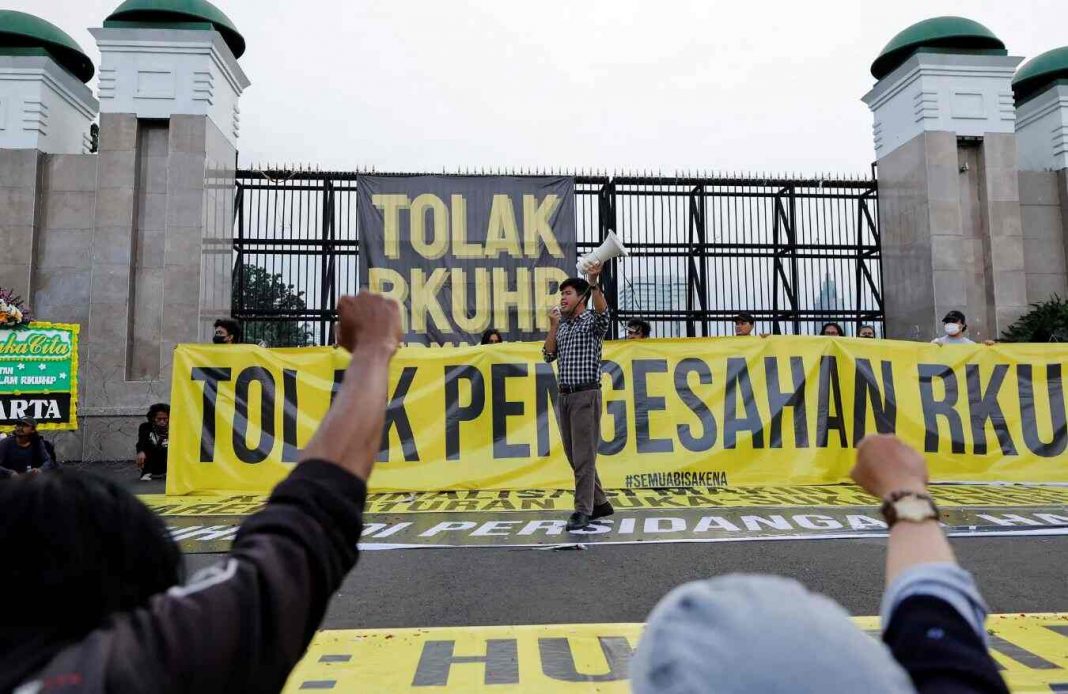Since ancient times, Indonesia has had a reputation for being an exceptionally tolerant society that has been at the forefront of leading democratic changes across Southeast Asia. This country’s image as a progressive leader took a knock on Tuesday when the government’s legislative body approved a major revision of the penal code.
Both having sexual relations outside of marriage and slandering the president are now punishable by law in Indonesia as a result of recent legislative changes. In addition, the rules against blasphemy were significantly increased as part of the reform in the nation with the biggest Muslim population in the world. Opponents of the guidelines said that by prohibiting extramarital sexual activity and implicitly targeting opponents of Islam, the restrictions constituted a substantial threat to religious minorities. Because homosexual marriage is against the law in Indonesia, extramarital sex acts as a kind of discrimination against the LGBT population. The new legislation could also restrict people’s ability to speak their minds and congregate as they like.
In the country of 276 million people, a discussion about democratic regression will almost certainly be resurrected as a result of the new legislation. Following the overthrow of the tyrant Suharto in Indonesia in 1998, the nation has taken great satisfaction in its status as a flourishing democracy. The majority of Indonesians maintained rather lenient attitudes about homosexuality, despite the fact that it was never criminalised formally.
However, in recent years, conservative Islam has gained popularity in the nation, and some people now worry that its influence is expanding even if its numbers remain a minority in Parliament. This is despite the fact that conservative Islam is still a minority in the country. Few authorities seem eager to upset the religious right in the run-up to the next presidential election in 2024, which helped clear the way for Tuesday’s revamp of the criminal code. This overhaul of the criminal code was passed on Tuesday.
According to Tim Lindsey, head of the Center for Indonesian Law, Islam and Society at the University of Melbourne, “It is a very substantial intrusion on rights and freedoms in Indonesia.” Some people believe that since the new regulations would apply to foreigners as well, they will reduce the allure of Indonesia as a destination for visitors, students, and investors.
The head of the Indonesian Legal Aid Foundation, Muhamad Isnur, said that the legislation “run counter to international human rights principles.” “He remarked that we have entered a new paradigm.”
On Tuesday, the measure received unequivocal support from all members of Parliament. The government has spent decades attempting to revise the legislation, but they have never been successful in doing so. In 2019, they attempted to enact a draught legislation that was very similar to this, but it was shelved by President Joko Widodo when tens of thousands of young people took to the streets to demonstrate against the proposal, alleging that it harmed their civil freedoms. This time, activists said they were taken aback when lawmakers suddenly announced on November 30 that they were handing a draught to Parliament to ratify, giving the activists very little time to organise demonstrations. The activists said that the lawmakers had no idea that the activists were planning to protest.
Before releasing the updated draught, Indonesian authorities said that they had been in communication with a number of human rights organisations over a period of many months. Legislators have said that they have included changes as a result of constituent criticism. One of these changes includes a provision that states blasphemy refers not just to religious belief but to all belief systems. The deputy minister of law and human rights in Indonesia, Edward Omar Sharif Hiariej, said that the government made an effort to accommodate as many groups as possible, but that they were aware that the makeover “won’t please everyone.”
Last month, Mr. Edward told reporters that the door of the Constitutional Court is wide open for anyone who feels that their constitutional rights have been violated. “If there are citizens who feel that their constitutional rights have been violated, the door of the Constitutional Court is wide open for that,” Mr. Edward said. The legislation, which are scheduled to go into force after a period of three years, would most certainly be contested in the Constitutional Court of the nation. There were calls for demonstrations to take place on Tuesday outside of Parliament.
Apostasy, which is defined as “anyone who “persuades someone to be a nonbeliever,” may now be prosecuted as a criminal crime, which is a significant expansion of the country’s blasphemy legislation, which went from having one provision to having six sections under the new penal code.
The people who are most likely to come afoul of this legislation are members of religious minorities. About 87 percent of Indonesia’s population identifies as Muslim, with the remaining population practising other religions such as Christian, Catholic, Hindu, or Buddhist. According to Mr. Harsono, the blasphemy legislation has been used against persons the majority of the time when they have made statements that are critical of Islam.
Christian and former Jakarta governor Basuki Tjahaja Purnama, who was an ally of Mr. Joko, was found guilty of blasphemy in 2017 and sentenced to two years in prison on blasphemy charges. He was accused of insulting Islam by making a light-hearted reference to a verse in the Quran while giving a campaign speech, and he was found guilty of the crime.

